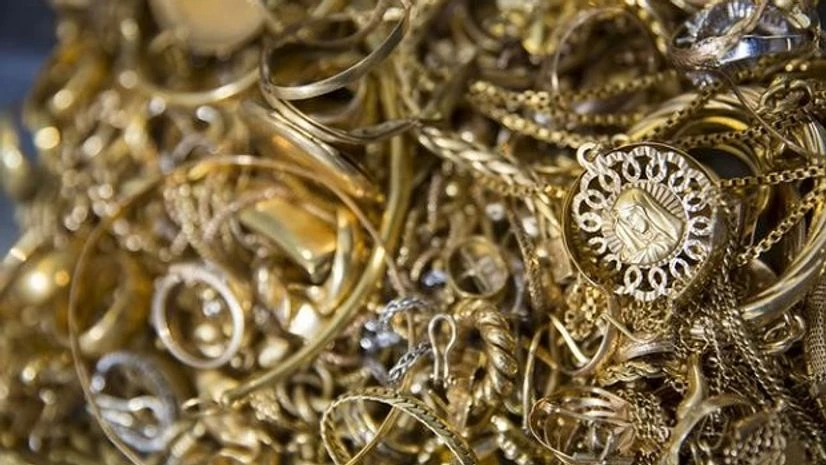Mumbai resident Shashikant Zhalte's wedding this weekend will be less sparkling than his family had hoped, thanks to a cash shortage following Indian Prime Minister Narendra Modi's shock withdrawal of high-value notes to fight "black money".
Zhalte bought gold jewellery for his wife-to-be months ago, but had delayed purchases for his mother and sisters.
Then came the Modi bombshell on Nov 8, in the middle of the wedding season when gold demand spikes, forcing Zhalte to drop his plans to buy an additional 50 gms, worth around $2,200.
The scenario is being played out across India, the world's second biggest consumer of gold, where it is customary to gift jewellery in marriages.
The wedding season stretches from September to April, and Thomson Reuters-owned metals consultancy GFMS says it accounts for more than half of the country's annual demand for gold.
Also Read
More than two-thirds of that demand of around 800 tonnes a year comes from the countryside, where farmers are struggling to get enough cash to buy seeds and fertilisers in the sowing season. Penetration of credit or debit cards and money apps is very low in rural India.
The resulting drop in incomes and tepid buying in the wedding season means gold imports, which spiked in the immediate aftermath of the banknote announcement amid panic buying, are likely to drop sharply in the coming months, said traders in India and in the supply hubs of Dubai and Hong Kong.
"Instead of shopping, we were busy visiting banks and government offices to prove that there is a wedding in the family," said Rahul Ahire, a cousin of Zhalte.
The Indian government has put strict limits on the amount of money people can withdraw from banks, although a larger sum, 2,50,000 rupees ($3,600), is allowed for weddings, as long as participants can prove that the marriage is genuine.
Gold demand from India is not a major factor in global prices, but has historically provided support when the international market is falling.
Gold is trading at its lowest levels in nearly 10 months in anticipation of a US interest rate hike in December. Higher US rates would boost the dollar and increase the opportunity cost of holding the metal.
A senior official with a Hong Kong bank, which caters mainly to Indian and Chinese gold buyers, said that it was worrying that the slowdown in Indian buying was overlapping with an expected rate hike by the US Federal reserve next month.
"In the past, physical Indian demand gave support whenever there was a sharp fall in global prices," said the official. "Without Indian buying, prices could fall steeply."
SLOWDOWN IN INDIAN GROWTH
Surendra Mehta, secretary of the India Bullion and Jewellers Association, said imports would be "negligible" in December and January, but did not give any numbers.
Traders said that a year ago India bought 182.2 tonnes in those two months, a figure that could fall to 60 to 70 tonnes this time around.
"Retail demand is very weak and since prices are falling, jewellers are not willing to build inventory," Mehta said. "They are postponing purchases."
Another factor that could hit imports is a plan reportedly being considered by the government to impose curbs on domestic holdings of gold. A third of India's gold demand is paid for by unaccounted money.
The scrapping of 500 and 1,000 rupee banknotes, or 86% of the value of cash in circulation, is part of a crackdown on corruption, tax evasion and militant financing.
But brokerage Ambit Capital says the decision could pull down economic growth, which was 7.6 percent last year, by as much as 4.1 percentage points in the year to March 2017.
"It wasn't possible to change the wedding date at the last moment, so I curtailed spending," says Dashrath Jagtap, whose daughter got married this week in a small village in the western state of Maharashtra.
Most Indian weddings are held on days considered auspicious in the Hindu calendar. Between Nov. 8 and end-December, there are 15 such days, or nearly a quarter of the total in 2016, making the note ban particularly painful for service industries that rely on weddings.
"There is a huge drop in the wedding demand as many people don't have the new currency," said Chirag Thakkar, a director at gold wholesaler Amrapali Group in the western city of Ahmedabad.
"It could be more than 50% (on a) year-on-year basis. Most people used to purchase in cash and now they are confused whether to buy gold or spend on something else."
A wholesale trader in Dubai said demand will continue to be weak until people feel comfortable with their cash levels. The government expects the cancelled notes to be replaced in a few months, but some experts say it could take up to a year.

)
